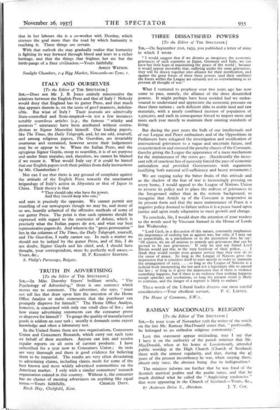THREE DISSATISFIED POWERS [To the Editor of THE SPECTATOR.] SIR,—On
September 21st, 1935, you published a letter of mine in which I wrote " I would suggest that if we dismiss as imaginary the economic grievances of such countries as Japan, Germany and Italy, we can have but little hope of maintaining the peace of the world ; because it would appear inevitable that,.suffering under the same grievances, they will be drawn together into alliance for their rectification, and against the great forces of these three powers (and their satellites) the forces within the League are certainly not so overwhelming as to prevent all thought of war."
What I ventured to prophesy over two years ago has now come to pass, namely, the alliance of the three dissatisfied powers. It might perhaps have been avoided had we endea- voured to understand and appreciate the economic pressure on these three nations ; each deficient alike in arable land and raw materials, with a yearly combined increase of population of 1,5oopoo, and each in consequence forced to import more and more each year merely to maintain their existing standards of living.
• But during the past years the bulk of our intellectuals and
of our League and Peace enthusiasts and of the Oppositions in Parliament have relegated the investigation and rectification of international grievances to a vague and uncertain future, and concentrated on and stressed the penalty clauses of the Covenant, thereby giving the League the appearance of a mere mechanism for the maintenance of the status quo. (Incidentally the inces- sant talk of sanctions has of necessity forced the pace of economic nationalism and ..provided Governments with arguments
justifying both national self-sufficiency and heavy armaments.) We are reaping today the bitter fruits of this attitude and as the shadow of the fear of war is increasingly pressing on every home, I would appeal to the League of Nations Union to reverse its policy and to place the redress of grievances in the foreground rather than in the remote background, to recognise that Article 19 of the Covenant is inoperative in its present form and that the mere maintenance of Peace is a negative policy doomed to failure unless it is a peace based upon justice and upon ready adaptation to meet growth and change.
To conclude, Sir, I would draw the attention of your readers to the words used by Viscount Samuel in the House of Lords last Wednesday.
" Lord Cecil, in a discussion of this nature, constantly emphasises the importance of exalting law as against war, but only, if I may say so respectfully, in a parenthesis or in the peroration does he say : ' Of course, we are all anxious to remedy any grievances that can be proved to be just grievances.' If only he and my friend Lord Davies would put this in the very forefront of their policy, . . . I think they would render even greater service than they now do to the cause of peace. So long as the League of Nations gives the impression that it considers itself to exist merely in order to maintain the arrangement of 5919, . . . so long as the League of Nations is a judicial body interpreting the law and not a legislature able to amend the law; long as it gives the impression that if there is violence something happens, but if there is no violence then nothing happens except speeches and resolutions, so long the present strain is likely to continue, and the danger of a rupture is likely to endure."
These words of the Liberal leader deserve our most careful consideration.—Your obedient servant, P. C. LOFTUS.
The House of Commons, S.W.r.














































 Previous page
Previous page